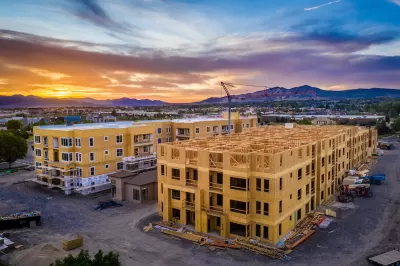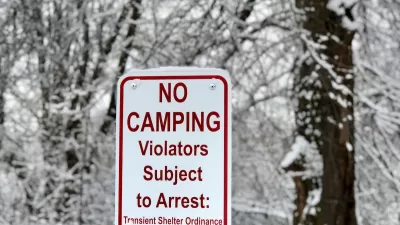How U.S. cities are seeking to diversify their funding sources for housing assistance programs and eliminate barriers to housing construction.

In an article for Smart Cities Dive, Kalena Thomhave outlines emerging trends in how cities approach reducing homelessness and alleviating the housing crisis, which continues to impact most American cities. “Just 34 affordable rentals are available for every 100 renters with extremely low income, according to the National Low Income Housing Coalition.”
As Thomhave notes, some cities are using their local power to reduce zoning restrictions on multifamily housing, enact tenant protection and rent stabilization laws, and outlaw discrimination against housing voucher recipients. “Alongside plans for the construction of permanent housing, cities are also building interim housing: safe, temporary housing for people experiencing homelessness.”
Cities are also looking for ways to reduce dependence on federal housing assistance programs. One such revenue source, the so-called “mansion tax” on transfers of high-value properties, was passed by over a dozen localities since 2018 and could become a significant source of new revenue for affordable housing programs.
Taking a different approach, some cities are taking more punitive measures against unhoused people after a Supreme Court ruling, Grants Pass v. Johnson, paved the way for the criminalization of homelessness.
FULL STORY: How cities could tackle homelessness in 2025

Planetizen Federal Action Tracker
A weekly monitor of how Trump’s orders and actions are impacting planners and planning in America.

Maui's Vacation Rental Debate Turns Ugly
Verbal attacks, misinformation campaigns and fistfights plague a high-stakes debate to convert thousands of vacation rentals into long-term housing.

San Francisco Suspends Traffic Calming Amidst Record Deaths
Citing “a challenging fiscal landscape,” the city will cease the program on the heels of 42 traffic deaths, including 24 pedestrians.

Defunct Pittsburgh Power Plant to Become Residential Tower
A decommissioned steam heat plant will be redeveloped into almost 100 affordable housing units.

Trump Prompts Restructuring of Transportation Research Board in “Unprecedented Overreach”
The TRB has eliminated more than half of its committees including those focused on climate, equity, and cities.

Amtrak Rolls Out New Orleans to Alabama “Mardi Gras” Train
The new service will operate morning and evening departures between Mobile and New Orleans.
Urban Design for Planners 1: Software Tools
This six-course series explores essential urban design concepts using open source software and equips planners with the tools they need to participate fully in the urban design process.
Planning for Universal Design
Learn the tools for implementing Universal Design in planning regulations.
Heyer Gruel & Associates PA
JM Goldson LLC
Custer County Colorado
City of Camden Redevelopment Agency
City of Astoria
Transportation Research & Education Center (TREC) at Portland State University
Jefferson Parish Government
Camden Redevelopment Agency
City of Claremont





























